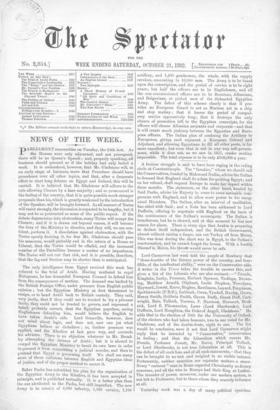Yesterday week was a day of many political speeches. Lord
Northbrook and Mr. Fawcett made considerable speeches in Liverpool, while the Duke of Richmond and Gordon and Sir Stafford Northcote addressed a select audience of Scotch Conservatives at Inverness. Lord Northbrook spoke twice, once at luncheon, in the Junior Reform Club, and once at Hengler's Circus, in the great demonstration of the evening. Lord Northbrook's morning speech was an entertaining criti- cism on Lord Carnarvon's boast that three-fourths of the literary power of England, and four-fifths of its intellectual ability, belong to the Conservatives. Lord Northbrook specu- lated with much humour on the methods by which Lord earner- von had arrived at those remarkable statistical results. It was probable, he thought, that Lord Carnarvon had sent round circulars, asking the political creed, literary capacity, and intellectual ability of his friends, and had concocted his statistics out of their replies. For his own part, Lord Northbrook, judging mainly by Conservative speeches, was not profoundly impressed with their literary or intellectual ability. They all begin, he says, with vehement 'denunciations of Mr. Gladstone, go on with a panegyric on the memory and policy of their "great leader," Lord Beaconsfield, and conclude with remarking that Conservatives are fighting for everything "which has made England the home of a free and enlightened people ;" but the middle of the speecle—the part where the stuff ought to come,—is apt to be a blank. The policy of the Con- servatives is either a secret, or an unknown quantity.



































